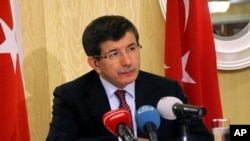The Turkish foreign minister is seeking to make Istanbul a center for mediation in resolving international crises. The initiative comes as Ankara seeks to resolve the conflict in Syria and tensions over Iran's nuclear energy program.
“Enhancing Peace through Mediation: New Actors, Fresh Approaches, Bold Initiatives," was the title for a recent gathering of foreign ministers, past and present, and leading academics.
The conference in Istanbul was part of an initiative in cooperation with Finland to establish Istanbul as an international mediation center.
Turkish Foreign Minister Ahmet Davutoglu, the architect of the initiative, says his country is ideally placed.
"Why is it so important for Turkey, we are right at the center of all these earthquakes, in geo-political earthquakes from Balkans to Central Asia. Turkey is right at the center. And all of the crises were directly or indirectly, historically and culturally, were related to Turkey," he said.
The initiative has a threefold approach; raising awareness of the importance of mediation, increasing mediation capacity within the United Nations and on a regional level, and for Turkey to enhance its role within its own region. The initiative has the strong support of the president of the U.N. General Assembly, Nassir Abdulaziz Al-Nasser. Addressing the meeting in Istanbul, he said there is need for a more regional approach to resolve crises.
"The significant and increasing role of regional and sub-regional arrangements, it is all natural that these organizations know and better understand, the situation on the ground in their own regions. The United Nations should therefore support regional actors and initiatives with a view to finding lasting solutions to disputes," Nassir said.
The ongoing bloodshed in Syria was very much in the forefront of the minds of those attending the meeting. Turkey, which shares a 900-kilometer border with Syria, is taking a leading diplomatic role in seeking an end to the fighting. Critics have said Ankara has failed to influence Damascus. But Turkish Foreign Ministry spokesman Selcuk Unal says they are still working for a diplomatic solution.
"Since the beginning of the Syrian crisis, we have been trying to solve this issue by diplomatic means and we will continue these efforts, and of course since bloodshed continues we cannot stay idle to that situation. The Arab League efforts failed, the U.N. Security Council resolution failed, that is why we have initiated a series of diplomatic efforts, which culminated in the Tunis meeting," Unal said.
The Tunis meeting, under the label "Friends of Syria," brought together countries supporting the Syrian opposition. Political observers say the meeting achieved few tangible results, but next month Istanbul will host a second meeting.
Istanbul is also to be the venue of an international gathering on the region's other major crisis - Iran's controversial nuclear energy program.
Last year, Turkey's vote in the Security Council against U.N. sanctions on Iran strained relations with its Western allies. But since then Ankara has come back into the fold by agreeing to participate in a NATO anti-missile defense system primarily aimed at countering Iran, and by its robust opposition to Damascus, a key ally of Tehran.
An international relations expert for the Turkish newspaper Haberturk, Soli Ozel, says despite strained relations with Iran, Turkey remains a dialogue partner for Tehran.
"Well basically shows no matter what your feelings are about Turkey it has to be part of any solution in Syria, for instance. But it may be the solution that the Turks prefer, and Iran as well. Iran still needs Turkey's good offices and it is the only country that really really tries very hard for a diplomatic solution. And Iranians believe they can trust Turks more because we are so dependent on them on gas and stuff like that," Ozel said.
The mediation initiative by Turkey seeks to formalize the growing diplomatic role the country is carving out for itself in a region that is facing increasing instability and crisis.
Turkey Seeks to Be International Mediation Center
- By Dorian Jones




